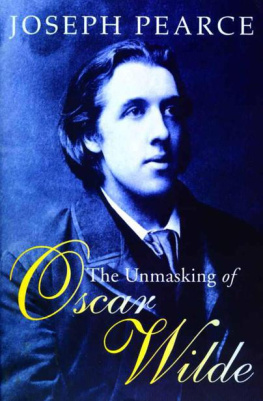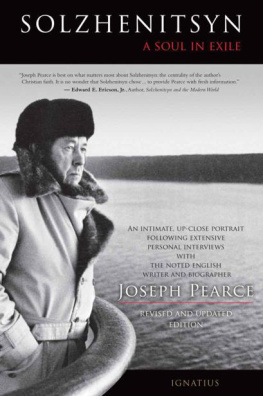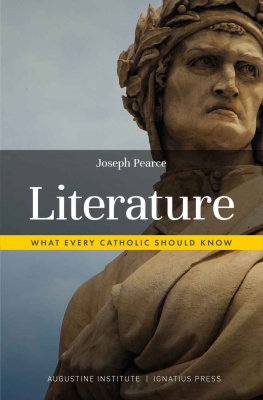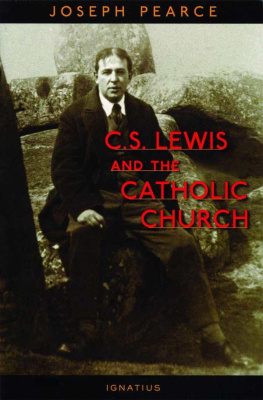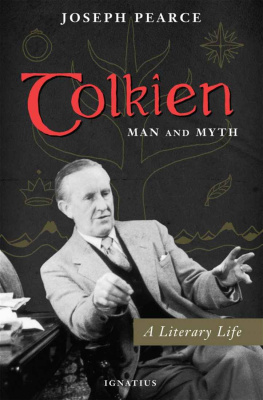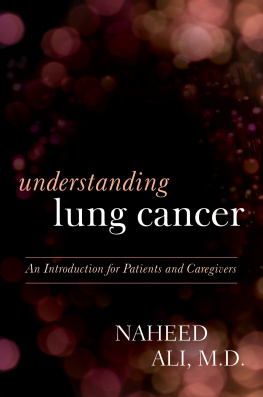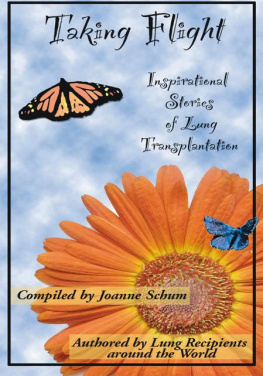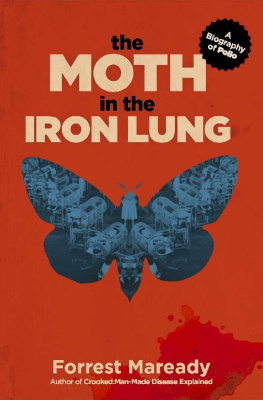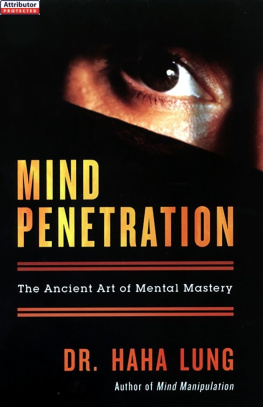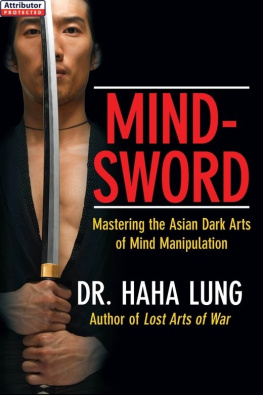
Copyright 2013 Joseph Pearce
All rights reserved. With the exception of short excerpts used in articles and critical review, no part of this work may be reproduced, transmitted, or stored in any form whatsoever, printed or electronic, without the prior written permission of the publisher.
Cover design by Chris Pelicano
Cataloging-in-Publication data on file with the Library of Congress.
ISBN: 978-1-61890-797-4
Published in the United States by
Saint Benedict Press, LLC
P.O. Box 410487
Charlotte, NC 28241
www.saintbenedictpress.com
Printed and bound in the United States of America.
For Bob and Conor Gallagher,
In Deepest Gratitude
CONTENTS
Prologue

THE ACCEPTANCE OF SUFFERING
One has to accept sorrow for it to be of any healing power, and that is the most difficult thing in the world. A priest once said to me, When you understand what accepted sorrow means, you will understand everything. It is the secret of life.
Maurice Baring, Darby and Joan
F ATHER Richard Ho Lung, founder of the Missionaries of the Poor, one of the fastest growing religious congregations in the world, is a great lover of literature, as he is a great lover of a great many things. In his earlier life, prior to giving up the creature comforts to offer himself in free service to the poor, he taught literature at university and high school level. He is particularly fond of the writing of T. S. Eliot, Gerard Manley Hopkins, and Fyodor Dostoyevsky. I have no idea whether Father Ho Lung has ever read Maurice Barings last novel, from which the above quote is plucked. I have no doubt, however, that he would agree with the words spoken by Barings fictional priest. The acceptance of sorrow or suffering is the secret of life. When we understand that we will understand everything, or, if not everything, we will at least understand everything necessary to save us from the lies and delusions with which the world endeavours to seduce us. Father Ho Lung knows this and, as we shall see, he knows something even greater, something that shows us not only the secret of life but the secret of love.
Maurice Baring, a great friend of G. K. Chesterton and Hilaire Belloc, was, like Father Ho Lung, a convert to the Catholic faith. He wrote the words quoted above about the acceptance of suffering as he was struggling with the debilitating effects of Parkinsons disease, the affliction that would eventually kill him.
Although acceptance of suffering is a choice, suffering itself is not. We are all doomed to suffer, whether we like it or not or whether we choose it or not. Suffering is not a choice, it is a gift. It is given to each of us. Most of us, to be sure, would rather not have it. Most of us do our best to avoid it. Since, however, it is unavoidable, the wise learn to accept it. It is, however, only the holy who openly embrace it and seek it out. It is the holy who understand the true secret of love as well as the true secret of life, which is not merely the acceptance of suffering but the joyful embrace of all suffering, not simply our own but that of our neighbor, and of our God. This is the ultimate secret that is revealed by the Suffering Christ and by those of his disciples, such as Father Ho Lung and the Missionaries of the Poor, who take up their crosses to follow Him. Suffering, properly understood in its Christ-like simplicity and complexity, is to be not only endured but enjoyed, not in any sordid masochistic sense but in the liberating sense of the lessons it teaches and the riches it bestows.
Scripture is awash with examples of souls being ennobled and enriched by the experience, acceptance and embrace of suffering. One of the most powerful is the example of the two thieves crucified on either side of Christ on Golgotha. These two thieves can be said to represent the whole of humanity. Both are sinners who have harmed their neighbors through acts of selfishness. Both are guilty of the crimes for which they are being punished and deserve the death that is meted out to them in justice. Neither can escape from their suffering. They are like the rest of us. They are, however, very different in the way that they view their own suffering and that of the innocent Man who is suffering with them. The bad thief does not care about justice. He does not feel guilty for the suffering he has caused to others. He wishes only to escape his own suffering. He scorns the innocent Man who is his God as he had scorned his fellow men who were his neighbors. Indeed God is his neighbor, nailed to the cross beside him for the sins the bad thief has committed. Insofar as the bad thief had caused suffering to his neighbor, he had caused suffering to his God. The good thief knows that he is as much a sinner as the bad thief and that he deserves equal punishment in justice for the suffering he has inflicted on his neighbor. The difference is that he accepts his suffering and begs his God, and by extension his neighbor, to forgive him. In accepting his suffering he is accepting the forgiveness. In the acceptance of both he is accepted by God into His Kingdom. Thus the acceptance of suffering is the precursor of the joy that is its consequence.
The acceptance of suffering may indeed be the secret of life, as Maurice Barings fictional priest tells us, but the joyful service of Christ on the Cross is the secret of love. This is the secret that Father Ho Lung and the Missionaries of the Poor are seeking to share with the suffering of the world.
Chapter One

FROM BUDDHA TO CHRIST
B ORN of a humble and simple origin, yet destined for a great and immeasurable task. Born under the shadow of anonymity, yet sealed to be a light in an era of indomitable darkness. Born concealed from the face of humanity, yet set to shine forth the light of a new civilization, a civilization of love, a civilization of the children of God. This is Fr. Richard Ryan Ho Lung. Such are the words of Brother Arnold, one of more than five hundred brothers of the Missionaries of the Poor (MOP), who have joined Father Ho Lung in a life of poverty.
It seems appropriate to commence our journey in the footsteps of the Founder of the Missionaries of the Poor by seeing him in the light of those who have followed him in the hardship of real life, of those who have embraced a life of poverty, chastity, obedience and free service to the poorest of the poor. Father Ho Lung is truly an extraordinary man; a man who has been blessed with extraordinary gifts. It is, therefore, decorous to commence with an evocation of the enormity of the mans achievement before we proceed to the humble place at which his life began.
Father Ho Lung founded the Brothers of the Poor, as they were then called, in 1981, with a handful of disciples, half of whom would leave soon afterwards to pursue a less challenging life. Today, a little over thirty years later, the Missionaries of the Poor have missions in Jamaica, Haiti, Uganda, Kenya, India, the Philippines, Indonesia and the United States. Their success they hope to be recognized officially by the Vatican with the bestowal upon them of the status of Pontifical Institute, the Churchs recognition that a religious congregation has become the Catholic equivalent of a global corporation. Continuing this intriguing and perhaps inappropriate and irreverent analogy, Father Ho Lung, a child of poor Chinese immigrants to Jamaica, is the equivalent of a CEO of a multinational missionary corporation! And yet this corporation, or institute, has no employees because nobody earns a salary. Furthermore, Father Ho Lung, its CEO, or Founder-Father, earns the same as everyone else: nothing. This is a global corporation with a difference, one which offers itself in free service to those who are poorest. The MOP does not accept any payment for its work because its customers are not able to pay. Amazingly, and some might say miraculously, this business model has proved a resounding success, with young men from India, Africa, the Philippines and the Caribbean desiring to join the company of Brothers. Father Richard Ho Lung, born of humble and simple origin, under the shadow of anonymity, in the poverty of Jamaica, has come a long way.
Next page

